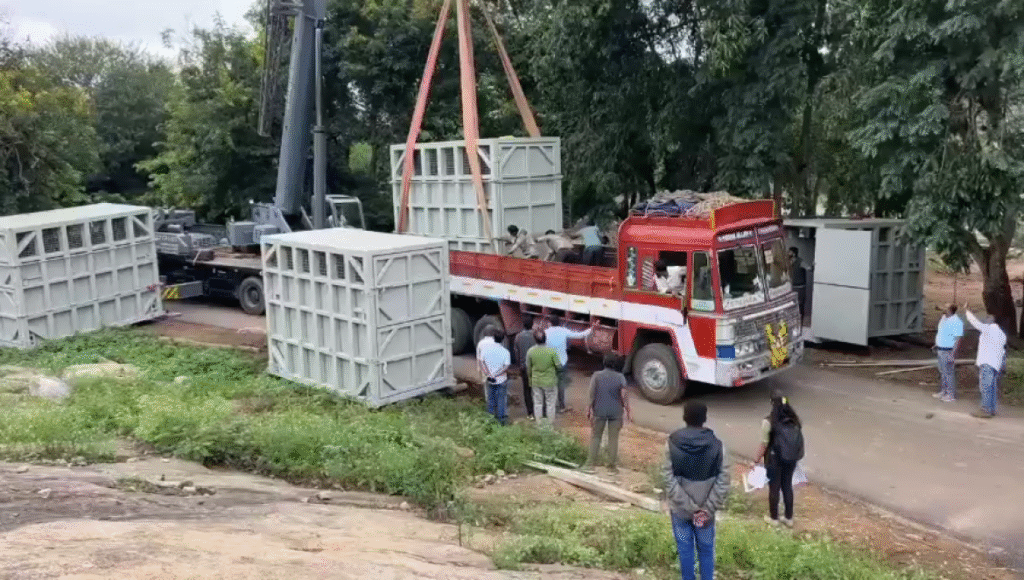In a historic first, Karnataka has sent four young elephants from Bengaluru’s Bannerghatta Biological Park (BBP) to Japan’s Himeji Central Park. This international wildlife exchange is not just a proud moment for Karnataka, but it also opens a new chapter in global animal conservation partnerships.
While Karnataka’s jumbos are set to charm visitors in Japan, the state is preparing to welcome several exotic animals in return, making this a balanced and significant exchange.
Table of Contents
🐘 Meet the Elephants Who Are Flying to Japan
The four elephants chosen for this monumental journey are Suresh (8 years), Gowri (9 years), Shruthi (7 years), and Tulsi (5 years). All of them were born and nurtured at Bannerghatta Biological Park, making them well-accustomed to human interaction. For the last six months, they have been carefully trained to travel in specially designed crates, ensuring they’re calm and comfortable during their trip.
Veterinary teams have conducted extensive health checks to ensure the elephants are fit for the journey.

✈️ How Are They Being Transported?
The elephants were flown in a Qatar Airways Boeing 777 cargo plane from Bengaluru’s Kempegowda International Airport to Osaka’s Kansai International Airport in Japan. The 20-hour journey was carried out with utmost care, adhering to international live animal transport standards.
Accompanying the elephants were a team of expert veterinarians, mahouts (elephant caretakers), and wildlife officials to monitor their health and comfort throughout the flight. Upon arrival, the elephants were given immediate medical attention and were allowed time to relax and adjust to their new surroundings. BBP staff will stay in Japan for a month to help the elephants settle into their new home.
🌏 Why Is This Wildlife Exchange Significant?
This marks the first-ever international animal exchange for Bannerghatta Biological Park. While many Indian states have exchanged elephants domestically for conservation or conflict-management purposes, Karnataka’s decision to send elephants overseas highlights the state’s commitment to global wildlife collaboration.
In exchange, Karnataka will receive exotic species like cheetahs, pumas, chimpanzees, jaguars, and capuchin monkeys, which will be housed in the state’s zoos to boost biodiversity and public awareness programs.
🏞️ Karnataka’s Expertise in Elephant Care
Karnataka is home to India’s largest wild elephant population, with over 6,000 elephants across its forests and elephant camps. The state runs several well-established elephant camps at Dubare, Sakrebyle, and K Gudi, where experienced mahouts from tribal communities train and care for captive elephants.
These elephants are not only a part of Karnataka’s rich cultural heritage but are also often used in forest patrols, conflict management, and public education about wildlife conservation.
Karnataka’s elephants have previously been sent to states like Andhra Pradesh, West Bengal, and Uttar Pradesh to assist in controlling human-elephant conflicts, but this is the first time they are being exported to another country.
READ ALSO : UPI to Trouble? The Real Impact of GST Notices on Karnataka’s Traders

🔄 Why Are Animal Exchanges Conducted?
- Strengthening International Wildlife Cooperation: Exchanging animals fosters better relationships between zoos and wildlife parks across nations, allowing them to share knowledge and resources for animal welfare.
- Enriching Biodiversity in Zoos: By bringing in exotic animals from other countries, zoos in Karnataka aim to enhance the educational experience for visitors, offering them the chance to see species not native to India.
- Showcasing Karnataka’s Animal Husbandry Excellence: Karnataka’s success in captive breeding and elephant management makes its elephants desirable for wildlife parks worldwide.
🐾 Ensuring Elephant Welfare During Transfers
Transporting large animals like elephants is a delicate process. The elephants were gradually trained to stay inside travel crates to minimize stress. A full team of veterinary experts, mahouts, and caretakers was assigned to ensure that the elephants were safe, well-fed, and calm during the flight.
Upon arrival, the elephants underwent immediate health check-ups and will continue to be monitored closely as they adapt to their new environment in Japan.
🐆 What Will Karnataka Receive in Return?
In exchange for the elephants, Karnataka’s zoos are set to receive rare species like cheetahs, jaguars, pumas, chimpanzees, and capuchin monkeys. These animals will not only increase the diversity of species in Karnataka’s wildlife parks but also support educational and conservation initiatives, offering visitors a chance to learn about exotic species.
READ ALSO : Top 7 Websites to Sell Your Photos Online in 2025 & Earn Money

📝 Conclusion: A Milestone in Global Wildlife Conservation
This wildlife exchange marks a proud moment for Karnataka and India as a whole. By sharing its well-trained, healthy elephants with Japan, Karnataka is showcasing its excellence in wildlife care and management on an international stage.
At the same time, the state will benefit by receiving exotic species that will enrich local zoos and enhance wildlife awareness among the public.
Such exchanges underline the importance of global cooperation in wildlife conservation, ensuring that future generations worldwide can appreciate and learn about diverse species.











One thought on “India to Japan Wildlife Exchange: Four Karnataka Elephants Fly Abroad!”